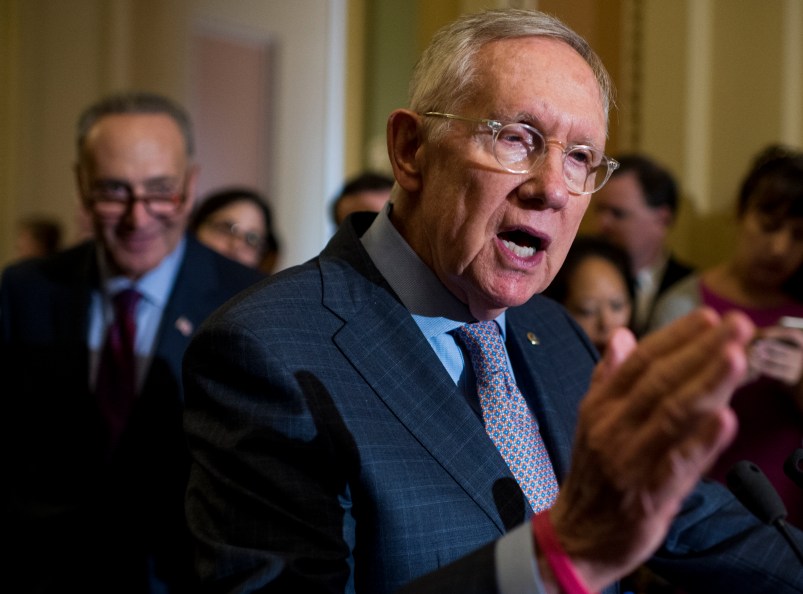Outgoing Senate Minority Leader Harry Reid (D-NV) said he is confident that he has laid the groundwork for Democrats to nuke the filibuster for Supreme Court nominees if they win back the Senate in November.
Envisioning Hillary Clinton in the White House and Democrats controlling the Senate, Reid warned that if a Senate Republican minority block her Supreme Court nominee, he is confident the party won’t hesitate to change the filibuster rules again.
Such a move would be an extension of what Reid did in 2013 when he was still majority leader, eliminating filibusters (with a simple majority vote) on the President’s nominees. There was only one exception: the Supreme Court. As it stands now, Democrats still need 60 votes to move forward with a Supreme Court nominee.
Reid said, however, that could change.
“I really do believe that I have set the Senate so when I leave, we’re going to be able to get judges done with a majority. It takes only a simple majority anymore. And, it’s clear to me that if the Republicans try to filibuster another circuit court judge, but especially a Supreme Court justice, I’ve told ’em how and I’ve done it, not just talking about it. I did it in changing the rules of the Senate. It’ll have to be done again,” Reid told TPM in a wide-ranging interview about his time in the Senate and his legacy.
“They mess with the Supreme Court, it’ll be changed just like that in my opinion,” Reid said, snapping his fingers together. “So I’ve set that up. I feel very comfortable with that.”
Reid has previously warned that a rules change could be coming down the pike if Dems win back the Senate. In an August interview with the New York Times, Reid said that rules changes were possible in 2017 if Republicans continued to use the filibuster to widely block a Democratic agenda in the Senate. But Reid’s comments have renewed resonance now that it looks increasingly likely that Clinton will win the presidency and Democrats have a growing chance of taking control back of the Senate.
Reid won’t be the one in charge, however. He’s retiring. The decision to make rules changes would have to be led by Sen. Chuck Schumer (D-NY), who will assume the role of majority leader if Democrats won in November.
Schumer’s office declined to comment on the future of rules changes in the Senate.
Questions surrounding what will happen to the Supreme Court have been central to the 2016 campaign after Republicans refused to move forward with President Barack Obama’s nominee to replace Justice Antonin Scalia. It’s been more than six months since Obama announced he was nominating Merrick Garland to the Supreme Court and Senate Republicans haven’t even held a hearing for him. Some GOP senators refused to meet with him.
Republicans had argued that it wasn’t fair Obama was trying to push forward a Supreme Court nominee in the final year of his presidency, but there are now signs that Republicans may continue to block a Democratic nominee for years to come.
In the wake of Republican nominee Donald Trump’s downward spiral, many down ballot Republicans have made the case that maintaining the Senate majority is vital to blocking Democrats from confirming liberal justices.
Sen. John McCain (R-AZ) landed in hot water last week after he vowed on a radio program that the Senate would “be united against any Supreme Court nominee that Hillary Clinton, if she were president, would put up.”
The comment raised questions about whether Republicans might continue to block a SCOTUS nominee indefinitely under a Democratic president, even after President Barack Obama leaves office.
McCain, under pressure, backed off of his position slightly, but it reopened the question: What do Democrats do if Republicans continue to block any Democrat-appointed justice to the Supreme Court?
Reid’s answer is clear: You change the rules.







how about getting rid of the filibuster for everything…or lowering it to 55 votes for everything.
Simple majority rule should be the way it’s done. The minorities the GOP says it’s protecting with the filibuster aren’t the kind of minorities the founders had in mind that needed protection.
YES. The Senate is worst deliberative body of its type in the Western world. Totally unrepresentative.
he probably should keep his mouth shut. Its not certain the Democrats will win the Senate majority and if not this kind of talk invites retaliation. Shut up and just do it if you win.
I hope Chuck Schumer has the stomach, stones, whatever part of the anatomy is appropriate here to go through with this. We’ve labored under a grotesquely conservative court for too long, to devastating effect on our electoral process and voting rights, not to mention giving us a horrible Preznit and the wars and economic damage for which he was responsible.